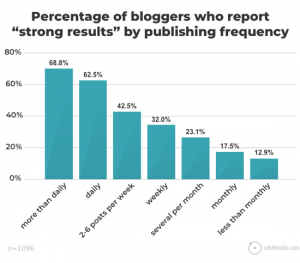
Unfortunately, there is no magic manual for starting a new business. I know, if only there was, right? And there’s no such thing as overnight success stories… that’s all hidden hard work. And no, we are not trying to scare you away from becoming a startup founder. We just want to make sure you know that it’s no easy feat.
The satisfaction you get from creating something (big or small) feels so good, but add in some negativity, and there comes complications. But with more satisfaction comes more obstacles you will have to leap over.
One thing that we know is that every startup journey begins with an existential crisis. We understand that this investment becomes a branch of their life, and every other startup founder knows this.
So we want to first tell you to take a deep breath and relax. Then, we’re going to walk you through some of the explicit goals you need to set and some strategies to help you succeed.
Early Important Goals For Startups
Get Online
A crucial lesson learned these past couple of years is that being online is an absolute must if you want to survive. Of course, this goes for any startup founder. Dog walking company? Get online. Personal trainer? Get online. Scuba Diving Pizza Delivery Man? Interesting, but also, get online.
So how do you ‘get online’? There are a couple ways. First is your website. This is your hub for people to understand who you are and what you sell.
Second, social. This is a great place to reach your target audience, build brand awareness, and educate consumers on the benefits of your goods or services. You must have a firm understanding of your audience and the message you want to get across before introducing your company to the world.
Provide Unique Profiles
As a startup founder, you have at least thought once if your business plan is unique. Which is smart. With so many businesses out there, you want to stand out and offer something new to the world. This also stands true to our customers. So you must establish and create your ideal customer. Remember that this will change and be refined over time, but you must understand who would benefit from your products or services the most.
Now you are thinking, how do I do this? A great place to start is to determine if you are a B2B or a B2C. And just to refresh your memory, here’s what they mean:
Business-to-Business (B2B) is a company that provides services or products to other businesses, such as those involving a manufacturer and wholesaler or retailer.
Business-to-Consumer (B2C) is a company that sells directly to individual consumers. They’re two separate business models that serve different customer types: businesses and the other direct to consumers.
Now, there are factors that you want to consider when you are creating your customer profile—as much as B2B is different from B2C, so are their consumers. So, here are some tremendous start-off questions to ask and answer yourself to get one step closer to understanding your consumer’s profile.
B2B
- Do your goods or services benefit a specific geographic location more than another?
- What range of revenue would a company need to have to afford your goods or services?
- Does your business target specific personas within these businesses, whether it be COO or Director of Marketing?
- What industries would likely need or want the goods or services you provide?
B2C
- What kind of person would benefit from your goods or services?
- Do your goods or services benefit a specific geographic location more than another?
- Do your goods or services help a particular target or people, whether parents, seniors or teens?
- What’s your consumer’s personal income bracket, and can they afford your goods or services?
Want to dip a little deeper? Good, you should. Here are some templates to build out your unique customer profiles. Keep in mind, there’s no such thing as one type of customer. It’s a great idea to build out more than one!
A Marketing Plan
A goal without a plan is really just a wish! And I hate to break it to you, but four-leaf clovers don’t work. So, let’s make a plan!!
Now, remember the three main marketing pillars that should be the foundation of every startup founder’s marketing plan are: social media, emails and traditional/SMS.
There are many reasons why it is crucial to add social media to your marketing plan, and it’s simple. First, it is where people spend most of their time online. This is not to say you don’t need a website. Of course you do, but there are 1 billion active users on Instagram as we speak. Social commerce also entails leveraging social media algorithms to understand customers’ social behaviours and preferences.
Now here is something that will never fail us if done correctly, email marketing. 80% of small businesses rely on email as their primary customer growth and retention channel. But the critical advice I cannot stress enough is good email marketing. There are many things that will make you end up in spam, like the rest of them. To benefit from email marketing, you want it to be personal, always have a CTA and make sure you have a click-worthy subject line.
When was the last time you looked at your phone? Are you reading this blog on your phone right now? My point is, we look at our phones a lot. Like, constantly! So SMS marketing is another way you can reach your consumers. But people’s phones are in their personal bubbles, so you need to be smart with getting permission, exclusive to the content you are sending them, and reaching out to them at the right time.
So, we have social media, email marketing and SMS—this is one sturdy foundation for a marketing plan. But why not make it stronger? We agree! Adding customer reviews and referrals are a great way to get a more prominent brand voice behind your company. And don’t forget, that goes for word of mouth too.

Start with Sales
I know, it sounds silly. But, obviously, every startup founder here is to make that moola. This is specifically about making that first sale of your goods or services! The structure is as important as your goals themselves. Set many goals, small and big, both matter as much as the other.
When anyone asks me what specific goals should I set? I say SMART ones.
To make sure your goals are clear and reachable, each one should be:
- Specific (simple, sensible, significant)
- Measurable (meaningful, motivating)
- Achievable (agreed, attainable)
- Relevant (reasonable, realistic and resourced, results-based)
- Time-bound (time-based, time-limited, time/cost limited, timely, time-sensitive)
Clean Your Budget
Yes, I know I may sound like your mother, but it’s time to clean your budget! The cleaner the budget, the better the chances of success. Being organized with your finances, having a solid understanding of your taxes, and setting a rainy day fund are all things that make up a clean budget.
A common mistake new business owners make is that as long as they can get their hands on a big enough wad of money, they can plop it in a business checking account, and it will surely satisfy all expenses. This is so wrong and far from wise. If you aren’t an expert at budgeting, enlist the help of someone who is. It’s crucial to have a super detailed budget before you spend a single penny.
Tips and Strategies to Move Forward
Be Social
Yes, introverts, this includes you too. If you want your business to succeed, you need to be social. As a startup founder, you need to be outgoing. You need to connect with people in person at networking events and online through your social media platforms.
Sometimes you have already done your homework and know the right people you need to know. Fortunately, you’d be ahead of a lot of people. And this isn’t to say you should stop networking because your mom’s friend’s uncle’s sister-in-law knows someone high up, close that gap and continue meeting and learning people, this will benefit you mainly in the long run.
If you don’t, keep going. Either way, having the ability to form new relationships and nurture and maintain existing ones is essential for the vitality of your business.
Planning is Everything
Remember what I said about planning? Well, I hope so. We all know how most things work out when there is no planning. There are always issues that will present themselves. Sometimes small, but also, there are times it’s big, and really, do you care to even risk that with your business?
The never-ending list of extensional details must be accomplished before you can successfully launch a new business. Build a business plan, set goals, and don’t skip steps because they’re tedious. Strategic grunt work is crucial and is the needed step for progress, but you’ll also be forced to choose tasks for specialists as your business matures.
You’re Not Alone
And you need to remember that. It’s a little too easy to get sucked into the stress of being a startup founder. There will be good days and bad days, and to be honest, those bad days might show up one after another, so it’s essential to surround yourself with a proper support system. Whether it be loved ones, employees, and particularly other startup founders and like-minded professionals, listening to their advice and using them as a shoulder to lean on is not only a good idea, but necessary.
And don’t forget, check your ego at the door before you enter the world of startups.
You Can’t Do It All
Just because you would rather do it yourself doesn’t mean you should. Don’t take this the wrong way, everyone isn’t great at everything. Focus your time and energy on your talents. The rest is where you ask for help. Finances are not many people’s strong traits, so bring in an accountant. Be humble and ask for help when you need it. Outsourcing can be an affordable way to manage tasks and delegate work.
Before you go hiring, do an analysis of how much time will be saved by hiring a specialist and calculate what you will earn with the time that has been liberated in your schedule.
Takeaway
If you only leave with one thing after reading this blog, it should be, don’t give up. Ever. And also, plan. Plan so much your plan’s plan has a plan. You will thank us in the end… You got this!
Business & Finance Articles on Business 2 Community
(34)








